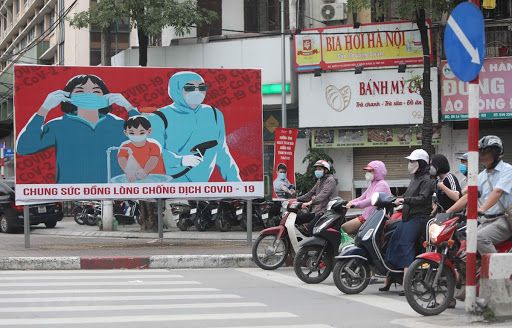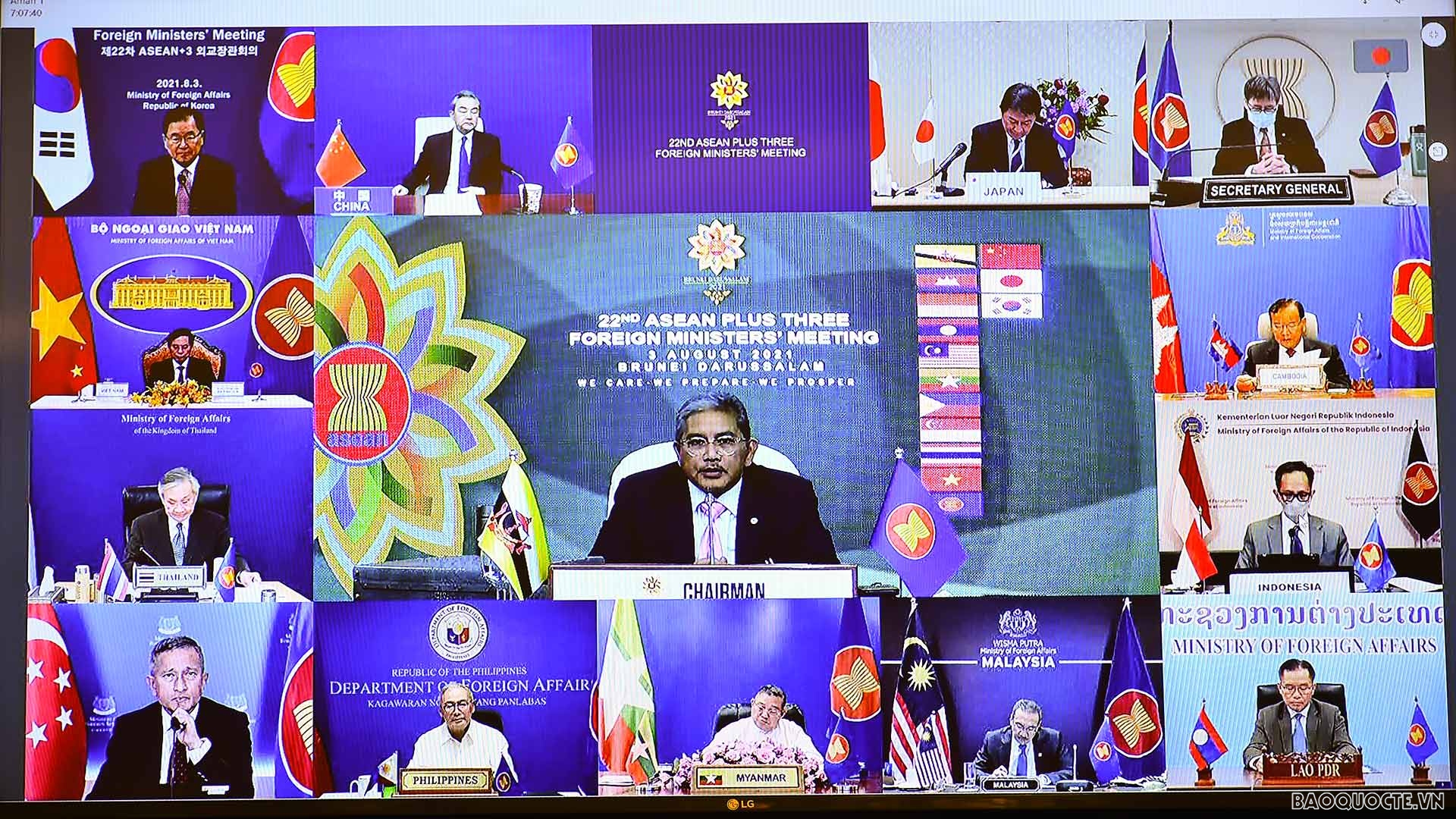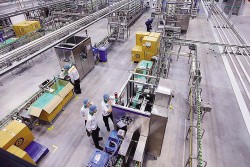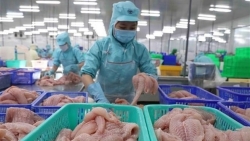
Experts praise Viet Nam for its anti-COVID measures and contribution to regional issues
Latest
 |
| According to foreign experts, Viet Nam proved itself a regional, if not global leader in curbing the spread of the coronavirus. (Photo: VNA) |
In 2020 and early 2021, Viet Nam kept COVID-19 at bay through a combination of border closures and social distancing enforcement. Recently, Viet Nam has scrapped a "zero-COVID" strategy in favor of a more flexible approach such as living safely with the virus, battling the pandemic and developing economy at the same time through vaccinating all people, adults, including workers, first and children later (scheduled in late October 2021), applying the stay-at-work mode first, and allowing workers to travel freely later…
Regional leader in curbing coronavirus spread
“Viet Nam experienced four waves of the COVID-19 pandemic from early 2020 to the present. Viet Nam acted swiftly and decisively when the first wave appeared by adopting global best practice in public health measures: closing its borders, testing, contact tracing, isolation and quarantine, closing schools and public gatherings, wearing face masks, social distancing, etc. These initial measures worked well. The subsequent waves of the pandemic required stringent measures such as lockdowns and limitations on travel,” stated Emeritus Professor Carlyle A. Thayer, the University of New South Wales at the Australian Defense Force Academy.
One problem Viet Nam has confronted throughout this period was acquiring sufficient vaccines to inoculate vulnerable members of society as well as essentials workers, he added.
The emergence of the Delta variant created a major public health emergency because of the speed of its spread and lethality. “Viet Nam’s leaders quickly concluded that its policy of Zero-COVID was not feasible. In response, Viet Nam’s leaders adopted a proactive two-track policy – acquiring sufficient vaccines to inoculate the population to be able to return to normal life and resume economic activity,” Thayer said.
According to the Australian expert, on the first track, Viet Nam launched a highly successful international campaign of COVID-19 diplomacy to acquire the vaccines needed. The country is now acquiring the technology and developing the capacity to produce COVID-19 vaccines domestically.
On the second track, Viet Nam stepped up its vaccination efforts with a focus on Ho Chi Minh City and affected provinces in the southern region. High numbers of the population were vaccinated and the stringent lockdown measures were rescinded, he said.
Meanwhile, James Borton, a senior fellow at Johns Hopkins University’s Foreign Policy Institute, author of the soon-to-released “Dispatches from the South China Sea: Navigating to Common Ground”, stated that certainly the waves of coronavirus in Ho Chi Minh City offered many challenges to the Vietnamese government’s response. The toll of a “zero COVID-19” strategy and with it the draconian measures undertaken was crippling the economy and collapsing any and all tourism. So, policy shifted to one of living with the virus through a series of phased re-openings.
“Certainly at the onset of COVID-19, Viet Nam proved itself a regional, if not global leader in curbing the spread of the coronavirus. In 2020, during its role as ASEAN chair, it solidified its leadership role in the regional fight against this pandemic,” Borton stated.
But in 2021, the Delta variant surge has washed over Viet Nam and other countries. Nevertheless, Viet Nam’s efforts to address the health storm have been seen in the videoconferences held, bringing together ASEAN Plus Three-China, Japan and South Korea. “These actions are recognized as important steps that were undertaken. Furthermore, credit must be given to Ha Noi in their measures to address the impact on vulnerable sectors, including women, children and the elderly,” said the American scholar.
 |
| The 22nd ASEAN+3 Foreign Minister's meeting was held via videoconference on August 3, 2021.( Photo: Tuan Anh) |
Champion of the developing world
As ASEAN Chair in 2020 and ASEAN member in 2021, Viet Nam has put forth many anti-COVID initiatives, proposals and measures, including activating virtual channels to ensure continuous communication among ASEAN members, fostering coordination of dialogues with partners (such as organizing ad-hoc ASEAN+3 discussions), providing medical equipment and protective gear to many countries in different continents, and establishing a regional reserve for medical equipment and essential products to meet urgent requirements… They have helped to strengthen ASEAN’s solidarity and cooperation on battling the pandemic and recovering economy.
“All of ASEAN should be grateful that Viet Nam was ASEAN Chair in 2020. Viet Nam quickly pivoted from “business as usual” to proactive leadership to address the COVID-19 pandemic on a regional and global basis,” stated Thayer.
According to the Australian expert, Viet Nam pioneered the use of virtual conferences to bring together both key ministers and high-level government leaders to adopt policies for Southeast Asia as a region. Viet Nam also used its extensive diplomatic network to solicit the support of major countries for ASEAN and its members.
“Viet Nam was also a champion of the developing world, as exemplified by President Nguyen Xuan Phuc’s address to the General Assembly of the United Nations. Viet Nam sought equitable access to vaccines for all countries and the transfer of intellectual property and technology to enable local production of COVID vaccines,” Thayer said. According to him, from the very beginning, Viet Nam set the stage for planning a post-COVID recovery strategy among ASEAN members.
“In sum, Viet Nam’s handling of the COVID crisis, while ASEAN Chair and subsequently, demonstrates why it has the reputation of being a responsible member of the international community,” Thayer stated.
Being a responsible member of the international community, Viet Nam has joined hands with other countries and major organizations to address global and regional issues, especially those are related to South China Sea disputes and Myanmar situations.
“Viet Nam’s diplomatic engagement in the South China Sea disputes and the crisis in Myanmar is a necessary but not sufficient condition for a successful resolution of these hot issues. Viet Nam brings domestic political stability and long-range strategic thinking to the ASEAN table. Viet Nam is practical in its approach to these issues. And Viet Nam supports a consensual decision-making process,” Thayer stated.
However, the sufficient conditions for a successful ASEAN rests on the political stability of its other members and their commitment to ASEAN centrality, the Australian expert noted. According to him, political instability opens the door for outside powers to interfere in the internal affairs of an ASEAN member state. Indeed, political instability in Myanmar can impact on neighboring states through the outflow of refugees and through disagreement among China, Russia and the United States.
Borton shared a similar view. According to the American expert, ASEAN members do have more shared interests than what policy experts have opined on in the past few years. There is evidence that there is a common policy regarding South China Sea interests.
“The consensus-building blocks revolve around the promotion of regional peace and stability. Viet Nam has been instrumental in their efforts to seek ASEAN’s help in restraining China’s control of the waters. Furthermore, claimant nations recognize the value of gaining ASEAN’s cooperation in helping to reign in China,” Borton said.

| Viet Nam sees FDI shift to hi-tech industries: Experts Foreign direct investment (FDI) flows into Viet Nam are shifting to hi-tech sectors, Assoc. Prof. Dr. Ha Van Hoi from the UEB-VNU has said. |

| Foreign experts highlight Viet Nam’s production, export strengths Within the region, Viet Nam ranks high on economic performance, fuelled by a powerful gain of manufacturing and export capability, according to economists Shirley Shen ... |

| Measures to turn Viet Nam into digital powerhouse: WB economist World Bank (WB) Lead Economist and Programme Leader for Viet Nam Jaques Morriset has pointed out solutions to turn the Southeast Asian nation into a ... |

| Firms must try to take advantage of FTAs: experts Russia is a potential market for Vietnamese exporters of farm produce to tap, experts said, saying enterprises should fully take advantage of the Viet Nam-Euroasian ... |

















